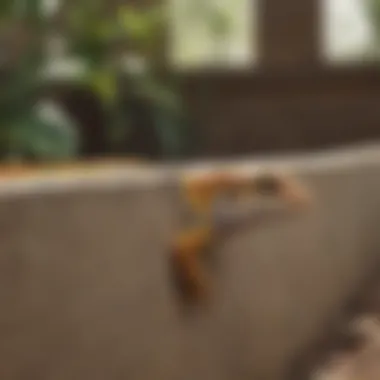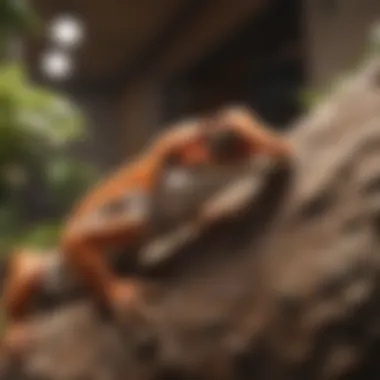Keeping Geckos Away: Effective Strategies for a Gecko-Free Environment


Interior Design Tips
When considering ways to keep geckos away from your living spaces, interior design plays a crucial role. To deter geckos effectively, opt for minimalist decor that minimizes hiding spots. Choose furniture with smooth surfaces where geckos cannot easily cling onto. Light-colored walls help in quickly spotting any unwelcome guests. Additionally, incorporating strategically placed lighting can make your space less appealing to geckos seeking shelter.
Trends in Deterrence Methods
Trendy techniques to discourage geckos involve utilizing natural deterrents like essential oils or vinegar sprays. These substances emit odors that geckos find repulsive, urging them to stay away. Another popular trend is the use of ultrasonic repellent devices that emit sound frequencies disturbing to geckos but inaudible to humans. Stay ahead by exploring these innovative solutions for a gecko-free environment.
Color Combinations for Gecko Prevention
Experts suggest specific color schemes that can deter geckos effectively. Shades of yellow or pink are believed to confuse geckos, leading them to perceive the environment as unappealing for habitation. By incorporating these hues strategically into your decor, you can contribute to keeping geckos at bay naturally.
Strategies for Furniture Arrangement
Strategic furniture placement is essential when aiming to create a gecko-free environment. Avoid placing furniture directly against walls to eliminate potential hiding spots for geckos. Opt for furniture with minimal gaps or spaces underneath to prevent geckos from seeking refuge. By following these furniture arrangement techniques, you can significantly reduce the chances of geckos invading your living spaces.
Understanding Geckos
In this segment focused on Understanding Geckos, we delve into the crucial knowledge necessary to create a gecko-free environment. By comprehending gecko behavior and habitat, individuals can effectively deter these creatures from their living spaces. Understanding the differences in their nocturnal nature and preferred living conditions is essential for devising successful strategies to keep geckos away.
Gecko Behavior and Habitat
Geckos are known for their nocturnal nature, being most active during the night. This behavior plays a significant role in their presence within households, often seeking shelter during the day and emerging at dusk. By understanding their nocturnal habits, homeowners can implement measures to reduce gecko sightings during nighttime activities, such as using lighting strategically to deter them. Additionally, geckos have preferred living conditions that include warm, humid environments near a food source, which usually consists of insects. Recognizing these preferences allows individuals to target these areas with preventive measures to discourage geckos from inhabiting spaces.
Nocturnal Nature


One of the key characteristics of geckos is their nocturnal nature, which enables them to hunt and feed during the night when their prey is most active. This behavior is advantageous for geckos as it increases their chances of successful hunting while avoiding predators that are active during the day. However, this nocturnal activity can pose challenges for homeowners who may encounter geckos more frequently during evening hours, impacting their comfort and peace of mind.
Preferred Living Conditions
Geckos thrive in preferred living conditions that offer warmth, humidity, and access to food sources like insects. These conditions are typically found in households with suitable hiding spots, moisture, and available prey. While geckos' adaptability allows them to survive in various environments, they gravitate towards settings that provide the necessary elements for their sustenance and reproduction. Understanding these preferred living conditions empowers homeowners to make targeted adjustments to create an inhospitable environment for geckos.
Why Keep Geckos Away?
This section delves into the reasons why preventing geckos from entering living spaces is crucial for maintaining a healthy and aesthetically pleasing environment. From health concerns to potential household damage, the presence of geckos can have various implications that homeowners should address to ensure a gecko-free setting.
Health Concerns
One compelling reason to keep geckos away is the potential health risks they pose to occupants. Geckos carry bacteria and parasites that can contaminate surfaces and food, potentially leading to illnesses. Individuals with allergies or compromised immune systems are particularly vulnerable to the presence of geckos, necessitating proactive measures to mitigate health concerns associated with their presence.
Household Damage
Apart from health risks, geckos can also cause damage to household structures and belongings. Their droppings, shed skin, and territorial behaviors can result in unsightly stains, odors, and contamination. Additionally, geckos may inadvertently damage household items or electrical wirings while seeking shelter or navigating indoor spaces. Preventing geckos from accessing and inhabiting homes is essential to safeguarding property and preserving the cleanliness and functionality of living spaces.
Natural Deterrents for Geckos
Natural deterrents play a crucial role in maintaining a gecko-free environment. By utilizing plant-based repellents and essential oils, homeowners can effectively keep geckos at bay. Understanding the importance of these strategies is essential for those seeking a harmonious living space free from unwanted reptilian guests.
Plant-Based Repellents
Plant-based repellents offer a safe and eco-friendly way to deter geckos from infiltrating homes. Among the popular choices are Lavender and Mint, known for their potent scents that repel geckos effectively. The aromatic properties of Lavender and Mint make them ideal for creating an inhospitable environment for geckos, deterring them from staying in close proximity. While these natural options are favored for their non-toxic nature, their effectiveness in repelling geckos should not be underestimated.


Lavender and Mint
Lavender and Mint are prized for their strong fragrances that are pleasant to humans but act as a deterrent to geckos. The scent of these plants disrupts the geckos' pheromone trails, steering them away from the treated areas. This natural method not only keeps geckos away but also adds a refreshing aroma to the surroundings. However, it's important to note that while Lavender and Mint are highly effective, their potency may vary, requiring periodic replenishment to maintain their repellent properties.
Citrus Peels
Citrus peels, such as those from oranges and lemons, emit a powerful odor that geckos find repugnant. Placing citrus peels strategically around entry points and common gecko hideouts can discourage these reptiles from lingering in the area. This natural deterrent is not only effective but also offers a practical way to repurpose kitchen waste. Despite its efficacy, regular replacement of the citrus peels is recommended to ensure a continuous barrier against geckos.
Essential Oils
Essential oils like Peppermint Oil and Tea Tree Oil serve as potent gecko repellents, owing to their strong scents and properties that deter these creatures. By harnessing the benefits of essential oils, homeowners can create an unwelcoming environment for geckos, safeguarding their living spaces from potential infestations.
Peppermint Oil
Peppermint Oil is renowned for its fresh and invigorating fragrance that acts as a powerful gecko repellent. The strong scent of Peppermint Oil overwhelms geckos' senses, discouraging them from remaining in the area. Additionally, Peppermint Oil possesses antimicrobial properties, contributing to a cleaner and safer indoor environment. When using Peppermint Oil, it's important to ensure proper ventilation and dilution to optimize its effectiveness.
Tea Tree Oil
Tea Tree Oil, known for its antibacterial and antifungal properties, is another effective gecko deterrent. The distinct fragrance of Tea Tree Oil masks the pheromones that geckos use to navigate, disorienting them and prompting their departure. As a natural solution, Tea Tree Oil offers a non-toxic alternative to chemical repellents, promoting a healthier living environment while keeping geckos at bay.
Cucumber Slices
Apart from plant-based repellents and essential oils, cucumber slices can also serve as a simple yet practical method to repel geckos. The odor of cucumber has been found to be displeasing to geckos, deterring them from frequenting areas where the slices are placed. This natural deterrent provides homeowners with an accessible and affordable means to discourage geckos from invading their living spaces. Regular replacement of cucumber slices is recommended to ensure continued effectiveness in repelling these reptiles.
Home Maintenance Strategies


Home Maintenance Strategies play a crucial role in ensuring a gecko-free environment within living spaces. By implementing proactive measures, homeowners can effectively deter geckos and maintain a clean and pest-free home. One key element of Home Maintenance Strategies is sealing entry points to prevent geckos from entering the premises unnoticed. This not only safeguards the house but also promotes a healthier living environment for residents. Through timely maintenance and regular inspections, potential entry points can be identified and secured, reducing the risk of gecko infestations.
Sealing Entry Points
Cracks and Gaps
Cracks and Gaps represent a significant aspect of sealing entry points to deter geckos effectively. These openings in walls, floors, or ceilings serve as access points for geckos to enter homes. The key characteristic of Cracks and Gaps is their ability to provide discreet entry for geckos while remaining unnoticed by occupants. By addressing and sealing these vulnerabilities, homeowners can block gecko access and minimize the chances of infestation. While Cracks and Gaps offer convenience for geckos, sealing them off poses advantages by enhancing home security and fostering peace of mind.
Doors and Windows
Doors and Windows constitute essential entry points that require meticulous attention to discourage geckos from infiltrating living spaces. These areas, if left unsecured, can serve as easy access for geckos to enter homes undetected. The key characteristic of Doors and Windows is their susceptibility to gaps and deficiencies that geckos can exploit. By prioritizing the reinforcement and sealing of Doors and Windows, homeowners can fortify their defenses against geckos. This proactive approach not only prevents gecko intrusion but also enhances the overall safety and hygiene of the household environment.
Decluttering Spaces
Decluttering Spaces is another fundamental aspect of maintaining a gecko-free environment within homes. By removing clutter and excess items, homeowners can eliminate potential hiding spots and nesting areas for geckos. This practice not only enhances the aesthetic appeal of the living space but also reduces the likelihood of gecko infestations. Decluttering Spaces allows for better surveillance and monitoring of gecko activities, enabling homeowners to detect and address any potential issues promptly. By decluttering regularly, homeowners can create a clean and organized environment that is less attractive to geckos, ultimately contributing to a pest-free home.
Professional Pest Control Services
In the realm of safeguarding your living spaces from geckos, considering professional pest control services holds substantial merit. These services bring a specialized approach to gecko management, offering targeted solutions that cater to the specific needs of your home environment. Professional pest control services encompass a wide array of benefits, ranging from the expertise of trained professionals in handling gecko infestations to the utilization of potent yet safe chemicals to eradicate these reptiles effectively.
Engaging professional pest control services ensures a thorough assessment of your property, identifying potential entry points and gecko hotspots. By employing advanced techniques and tools, pest control experts can implement strategic measures to eliminate geckos and prevent future invasions. The importance of professional pest control services lies in their ability to provide a comprehensive solution to eradicate geckos while safeguarding the well-being of household members and pets.
When To Seek Expert Help Determining the apt moment to seek expert help for gecko infestations is crucial in maintaining a gecko-free environment. Recognizing signs of a gecko infestation, such as droppings, shed skin, or visible sightings, signifies the need for immediate intervention from pest control professionals. Additionally, if DIY remedies and preventive measures prove ineffective in curbing gecko populations, it is advisable to seek expert assistance promptly.
Timely intervention is key to preventing geckos from proliferating and establishing breeding grounds within your home. Pest control professionals possess the requisite knowledge and experience to address gecko infestations promptly and efficiently. By entrusting the task to experts, homeowners can rest assured that their living spaces will be free of geckos and potential health risks associated with these creatures.
Conclusion
In the realm of managing geckos and maintaining a wholesome living environment, the Conclusion segment acts as the pivotal point culminating the discourse on strategies for a gecko-free habitat. Delving deep within the fabric of this article, the Conclusion section carries the torch of guidance by encapsulating key insights, crucial considerations, and practical benefits essential for readers seeking a proactive stance against gecko intrusion. As we navigate through the labyrinth of gecko prevention methods, the Conclusion smoothly steers us towards a comprehensive understanding, ensuring that all elements from logical reasoning to actionable tips are duly imparted. The discerning homeowner, interior design enthusiast, or gardening aficionado envisioning a gecko-free setting will find the Conclusion a beacon of enlightenment, offering a roadmap towards sustainable cohabitation with these reptilian visitors.
Maintaining a Gecko-Free Environment
Continuing the quest for a gecko-free haven, the subheading 'Maintaining a Gecko-Free Environment' emerges as a critical juncture in the narrative, advocating a proactive approach towards sustainable gecko deterrence. An in-depth exploration of this facet reveals a mosaic of preventive measures and strategic choices that aspire to empower individuals with the knowledge and tools necessary to thwart gecko intrusion effectively. From assessing potential entry points to implementing meticulous decluttering practices, the diligent homeowner embarks on a journey marked by vigilance and practicality, ensuring that geckos find no sanctuary within the confines of their abode. By shedding light on the nuances of maintaining a gecko-free environment, this section stands as a testimonial to the harmonious coexistence of man and reptile, underscoring the importance of vigilance, preparedness, and informed decision-making in the perpetual battle against unwelcome gecko guests.







